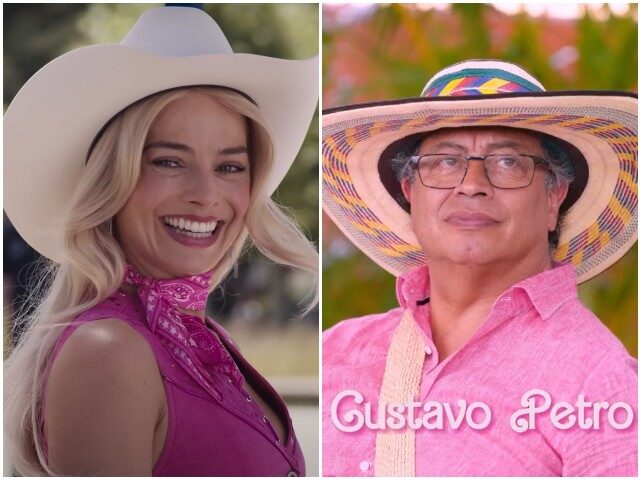The official TikTok account of the presidency of Colombia posted a video over the weekend using footage from the upcoming film Barbie to invite Colombians to the federal government’s July 20 Independence Day celebrations.
The video has been deleted from the presidency’s official account as of Monday but is still being shared widely online via various social media platforms. The Colombian government has not publicly commented on the reason behind the video’s removal. There is no indication that the creators of Barbie participated in or authorized this use of their materials.
¿Qué les parece la invitación de la Presidencia (@infopresidencia) para la celebración del 20 de Julio?
Cuenta con la participación especial del presidente @petrogustavo y la vicepresidenta @FranciaMarquezM
¿Original o fuera de lugar? pic.twitter.com/jnKM5hUlaN
— Orlando Villar (@ovillar) July 17, 2023
“This July 20, the Government of Change comes to San Andrés. Let’s celebrate our sovereignty. We are waiting for you!” the video’s captions read, showcasing footage taken from Barbie’s official trailer, featuring actors Margot Robbie and Ryan Gosling with photos of both far-left Colombian President Gustavo Petro and Vice President Francia Márquez spliced in between.
Watch the Barbie trailer below:
The video also features the song “Dance the Night” by British singer Dua Lipa as musical background, which appears on the upcoming film’s official soundtrack.
Barbie, a comedic fantasy film based on the longstanding line of dolls manufactured by American toy company Mattel, is scheduled for release in Colombia on Thursday, July 20, a day before its U.S. release.
July 20 also marks Colombia’s Independence Day, when the nation celebrates separating from Spanish rule in 1810.
Petro, a former member of the Marxist M19 guerrilla and Colombia’s first leftist President in the nation’s history, has chosen to host his government’s July 20 official events in San Andrés, a Colombian island in the Caribbean Sea off the coast of Nicaragua.
The island has been part of a decades-long maritime dispute between Colombia and Nicaragua that was finally resolved last week when the International Court of Justice at the Hague rejected Nicaragua’s claims and ruled in favor of Colombia.
Thursday’s upcoming July 20 festivities are the first hosted by Petro, who took office on August 7.
Being Colombia’s first leftist government, Petro’s administration describes itself as the “Government of Change,” a title referring to a wide array of leftist reforms that Petro seeks to implement in the South American nation. Petro’s policies have prompted thousands of Colombians to peacefully protest against his administration on a nearly monthly basis. Petro has, so far, failed to implement his reforms during his first year in office.
The controversial video spawned a series of comments, mockery, and criticisms from politicians, political parties, and Colombian citizens. It also inspired a wave of memes shared through the hashtag #PetroBarbie on Twitter.
“Someone came up with it, someone else saw it, someone else approved it and thought it was a good idea,” the center-right Radical Change party commented on its official Twitter account. “The question is, how could those in the presidency believe that associating Barbie with July 20 was a ‘great idea’? Funny, but not laugh-out-loud funny. Funny in a weird way.”
A alguien se le ocurrió
Otro lo vio…
Alguien más lo aprobó y pensó que era una buena idea…
La pregunta es: ¿cómo en Presidencia pudieron creer que asociar #Barbie con el 20 de julio era una 'ideota'? 🏻♂️.
Gracioso, pero no gracioso de risa. Gracioso de raro . #PetroBarbie https://t.co/tcDeR6dudG pic.twitter.com/gfQ3bnG19F
— Cambio Radical (@PCambioRadical) July 17, 2023
“The PetroBarbie thing is not only shameful and an offense to a national celebration, but another incoherence of Petrismo,” Colombian politologist Nicolas Gomez Arenas said. “They claim to hate evil capitalism and look at them, posing as Barbies. Could it be a strategy to hide the disaster and massacres they are carrying?”
“If anything represents the ancestral struggle against the empire, it’s celebrating the cry for independence with an official video of President Barbie: a message against the middle class/unscrupulous/slaver white man,” Colombian comedian and columnist Daniel Samper Ospina commented.
Si algo representa la lucha ancestral contra el imperio es celebrar el grito de independencia con un video oficial del presidente Barbie: un mensaje contra el blanquito de clase media/arribista/esclavista. #PetroBarbie pic.twitter.com/xiIXIfxDlP
— Daniel Samper Ospina (@DanielSamperO) July 17, 2023
Petro’s use of footage from the Barbie film is not the first controversy that the upcoming production has found itself surrounded by. On the other side of the planet, the National Department of Cinema banned the film from being released in Vietnam for showing a map allegedly including China’s “Nine-Dash Line” in one of its scenes. The Nine-Dash line is a fictitious border that the Chinese Communist Party made up that puts almost the entire South China Sea under Chinese control, including significant percentages of the territory of Vietnam.
The same map caused similar controversy in the Philippines, with the nation’s censors ruling in favor of allowing the film in theaters so long as the map is blurred out. The Philippines Movie and Television Review and Classification Board ruled in favor of allowing the film’s release after it was convinced that the “cartoonish” map was, in fact, part of a “make-believe journey of Barbie from Barbie Land to the real world” and an “integral part of the story.”
Christian K. Caruzo is a Venezuelan writer and documents life under socialism. You can follow him on Twitter here.

COMMENTS
Please let us know if you're having issues with commenting.